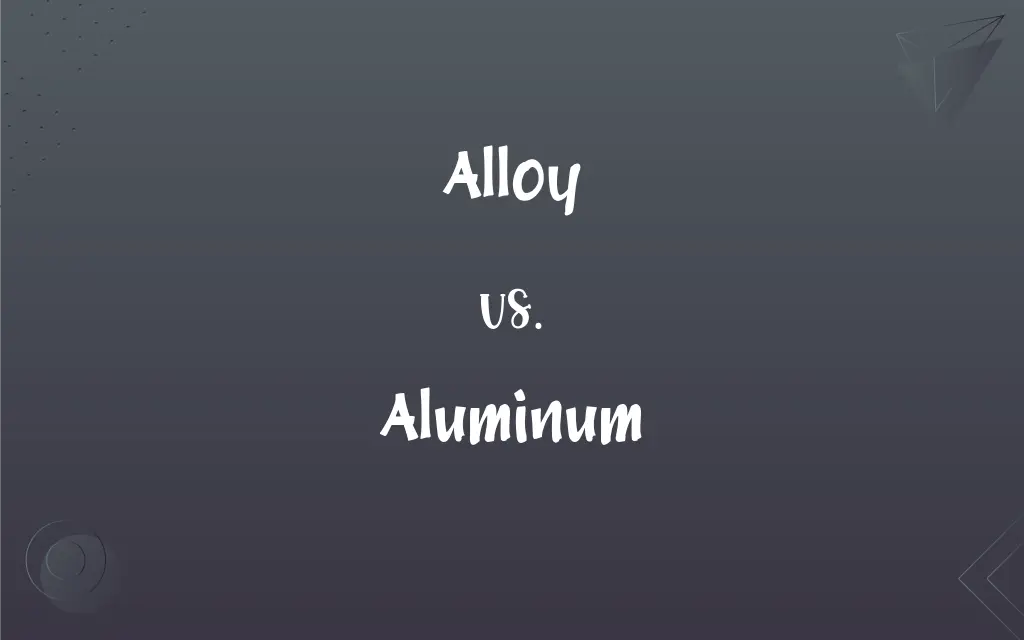Alloy vs. Aluminum: What's the Difference?
Edited by Aimie Carlson || By Janet White || Published on February 29, 2024
An alloy is a mixture of metals or a metal combined with one or more other elements, while aluminum is a lightweight, silvery-white metal.

Key Differences
An alloy is a combination of two or more elements, where at least one is a metal, to enhance material properties. Aluminum, on the other hand, is a pure chemical element, known for its lightweight and corrosion resistance, and often used to create alloys.
Alloys are designed to have improved strength, hardness, or other desired properties, depending on their composition. Aluminum is naturally soft and ductile but can be mixed with other elements like copper or magnesium to form an alloy with enhanced properties.
Alloys, due to their customizable properties, are used in a wide range of applications from construction to aerospace. Aluminum, being lightweight and non-corrosive, is ideal for applications like packaging, transportation, and electrical conductors, both as a pure metal and in alloys.
The versatility of alloys lies in the ability to tailor their properties for specific applications by varying their composition. Aluminum, while versatile in its own right, gains even greater utility when alloyed with other elements to meet specific engineering needs.
Examples of alloys include steel (iron and carbon), brass (copper and zinc), and aluminum alloys (aluminum and various other elements). Pure aluminum, however, is often found in foil, window frames, and airplane parts, where its light weight and resistance to corrosion are valued.
ADVERTISEMENT
Comparison Chart
Definition
A mixture of two or more elements, with at least one metal
A chemical element, lightweight and silvery-white
Properties
Customizable strength, hardness, etc.
Naturally soft, ductile, corrosion-resistant
Applications
Broad (e.g., construction, aerospace)
Packaging, transportation, electrical conductors
Composition Variety
Can vary widely
Consistent (pure element)
Example Uses
Steel in construction, brass in musical instruments
Foil in packaging, frames in construction
ADVERTISEMENT
Alloy and Aluminum Definitions
Alloy
An alloy is a mixture of metals or metal with other elements to improve its properties.
The bridge was constructed with a steel alloy for enhanced strength.
Aluminum
Pure aluminum is soft and often used in combination with other metals to form alloys.
Aluminum is alloyed with copper to improve its mechanical properties.
Alloy
The use of alloys extends across industries due to their customizable compositions.
Car engines are often made with aluminum alloys for lightness and strength.
Aluminum
Aluminum is the third most abundant element and is used extensively in various industries.
Aluminum cans are popular in the beverage industry due to their recyclability.
Alloy
Alloys are engineered to meet specific requirements like increased durability or conductivity.
The alloy used in these wires ensures better electrical conductivity.
Aluminum
Aluminum is used in transportation and construction for its light weight and strength.
The aircraft's structure includes aluminum components for weight reduction.
Alloy
An alloy combines different elements to create a material with unique characteristics.
Brass, an alloy of copper and zinc, is widely used for musical instruments.
Aluminum
Aluminum is a lightweight, silver-white metallic element, known for its corrosion resistance.
The window frames are made of aluminum for long-lasting durability.
Alloy
Alloys are fundamental in creating materials with tailored thermal, electrical, or magnetic properties.
This high-temperature alloy is ideal for aerospace applications.
Aluminum
Aluminum is valued for its non-toxicity and thermal conductivity in various applications.
Aluminum foil is used in cooking due to its heat-conductive properties.
Alloy
A metallic solid or liquid that is composed of a homogeneous mixture of two or more metals or of metals and nonmetal or metalloid elements, usually for the purpose of imparting or increasing specific characteristics or properties
Brass is an alloy of zinc and copper.
Aluminum
A silvery-white, ductile metallic element, the most abundant in the earth's crust but found only in combination, chiefly in bauxite. Having good conductive and thermal properties, it is used to form many hard, light, corrosion-resistant alloys. Atomic number 13; atomic weight 26.9815; melting point 660.32°C; boiling point 2,519°C; specific gravity 2.70; valence 3. See Periodic Table.
Aluminum
Standard spelling of aluminium
Aluminum
The metallic element forming the base of alumina. This metal is white, but with a bluish tinge, and is remarkable for its resistance to oxidation, and for its lightness, having a specific gravity of about 2.6. Atomic weight 27.08. Symbol Al. Also called aluminium.
Aluminum
A silvery ductile metallic element found primarily in bauxite
FAQs
What are common aluminum alloys?
Common aluminum alloys include those combined with copper, magnesium, or silicon.
What is an alloy?
An alloy is a mixture of two or more elements, typically metals, to improve or alter their properties.
What is aluminum?
Aluminum is a silvery-white, lightweight metallic element used in various applications.
Can aluminum be an alloy?
Yes, aluminum can be part of an alloy when combined with other metals or elements.
Why is aluminum popular in construction?
Its light weight, strength, and resistance to corrosion make aluminum popular in construction.
What industries use aluminum alloys?
Aluminum alloys are used in aerospace, automotive, construction, and packaging industries.
Can alloys be recycled?
Yes, most alloys, including those with aluminum, can be recycled.
How are aluminum alloys made?
Aluminum alloys are made by melting and combining aluminum with other elements.
Are all alloys made with aluminum?
No, alloys can be made from a variety of metals, not just aluminum.
Is pure aluminum stronger than its alloys?
No, pure aluminum is softer, and its alloys are usually stronger due to the added elements.
Are aluminum alloys expensive?
The cost of aluminum alloys varies depending on the alloying elements used.
What properties do aluminum alloys have?
Aluminum alloys often have enhanced strength, durability, and corrosion resistance.
How does the strength of aluminum compare to steel?
Aluminum is generally lighter and less strong than steel, but some aluminum alloys can achieve comparable strength.
Is aluminum eco-friendly?
Aluminum is considered eco-friendly due to its recyclability and abundance.
Do aluminum alloys corrode?
Aluminum alloys are generally corrosion-resistant, though some may corrode under certain conditions.
Is pure aluminum used in electrical wiring?
Pure aluminum is not typically used in wiring; aluminum alloys are preferred for better conductivity.
What is the main advantage of using aluminum in vehicles?
The main advantage is reducing the vehicle's weight, improving fuel efficiency.
Can aluminum be used in high-temperature applications?
Aluminum's melting point limits its use in high-temperature applications, but some alloys can withstand higher temperatures.
Do aluminum alloys have good electrical conductivity?
Some aluminum alloys have good electrical conductivity, suitable for certain electrical applications.
Is aluminum magnetic?
No, aluminum is non-magnetic.
About Author
Written by
Janet WhiteJanet White has been an esteemed writer and blogger for Difference Wiki. Holding a Master's degree in Science and Medical Journalism from the prestigious Boston University, she has consistently demonstrated her expertise and passion for her field. When she's not immersed in her work, Janet relishes her time exercising, delving into a good book, and cherishing moments with friends and family.
Edited by
Aimie CarlsonAimie Carlson, holding a master's degree in English literature, is a fervent English language enthusiast. She lends her writing talents to Difference Wiki, a prominent website that specializes in comparisons, offering readers insightful analyses that both captivate and inform.






































































